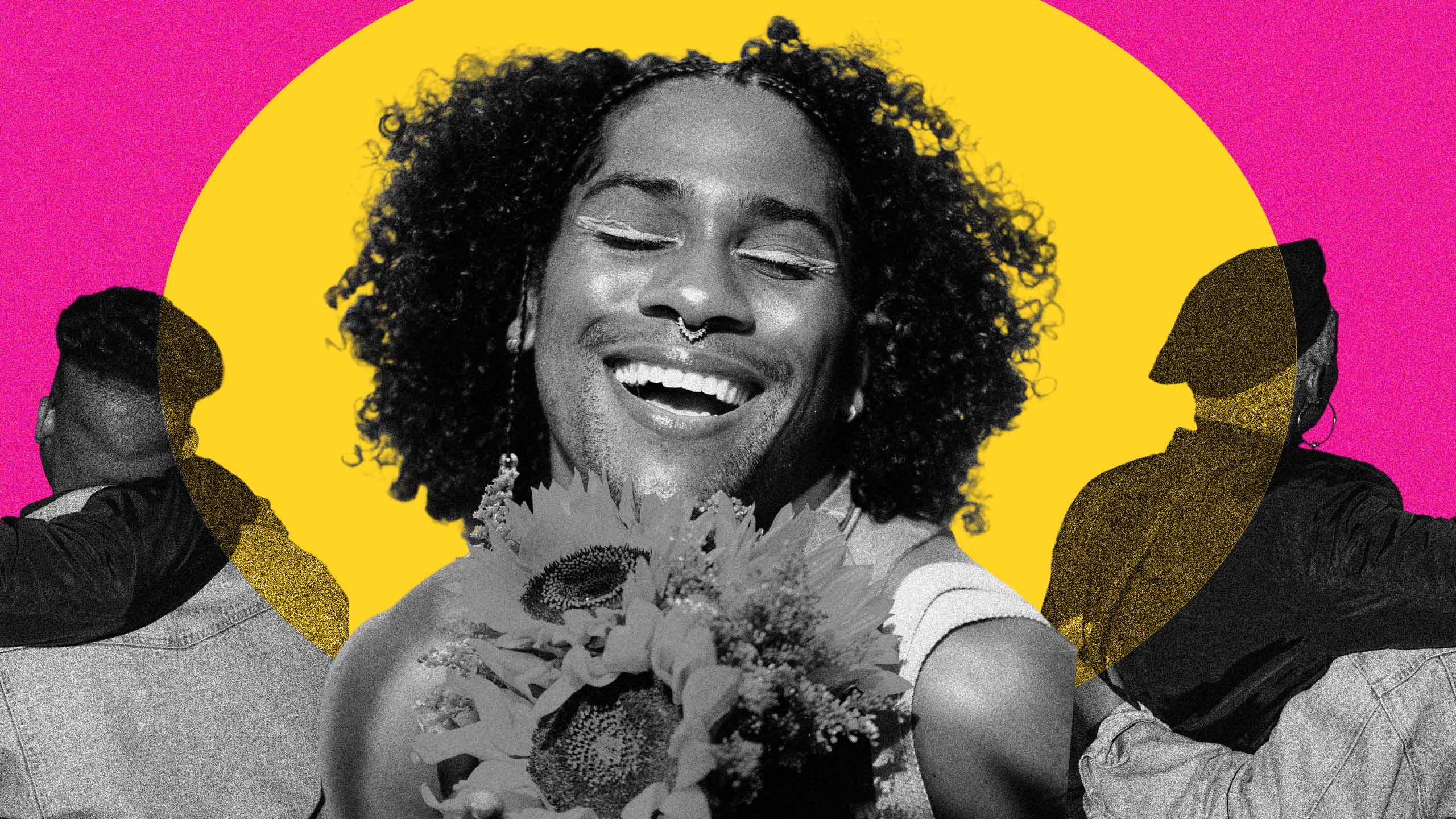Joy can be a fleeting emotion. Perhaps for this reason I’ve relished the opportunity to capture moments of Black joy—Black trans joy, Black queer joy—through my drawing project Activist Portrait Series. I’ve been able to draw, larger than life, moments of belly laughter, of teeth exposed, torsos bent in wriggling joy. I’ve been thinking a lot about joy this year—as we have witnessed a rising tide of right-wing backlash to any wins we have had since the uprisings of 2020 around racial justice and queer justice. How do we hold on to joy in moments when lawmakers, judges and those who uphold the laws, and everyday citizens who push for such legislation, seem hell-bent on our despair and disappearance? To better understand the role of joy in these moments of strife and unrest, I turned, as I always do, to Black queer and trans artists to help me make sense of the now.
Dainty Smith, playwright, performer and founder and house mother of Les Femmes Fatales, a burlesque troupe focused on showcasing QTBIPOC artists, stresses that “I am a Black, queer/bisexual woman, whose body holds chronic pain and I live under capitalism. I am always aware of how vulnerable I am and how precarious my living is.” Smith says she has been accessing Black queer joy “by looking at the past and trying to imagine the future. I think that the adopted ancestors that I look to, from Josephine Baker to Octavia Butler, who also lived through beautiful and terrible times.” Smith reminds us that it is important to turn toward those who have come before us and to also remember that we, too, are going to be ancestors for future generations. By seeding forward through our actions today, we can lay the foundation for a generation of joyful and complex Black queer crip communities. As Smith suggests, “I imagine in future the possibilities must be endless. In my current reality, artmaking, rest, moving slowly and intentionally, community care and dreaming are the constant.”
Ravyn Wngz, choreographer, dancer and co-founder of Wildseed Centre for Art & Activism, a 10,000-square-foot community space launched by Black Lives Matter for Black communities across Tkaronto, says she finds joy in connection to Elders, the Land and with ancestors. “When I turn to the land for eldership and guidance in this time of apocalypse, when I sit at Lake Kandario and watch the currents flirt and sway, I am reminded that love liberated me. That my choice to live while I’m alive is a generational frequency passed down to me by my transcestors. This is where I find joy.” Perhaps the solution to finding (and maintaining) Black queer and trans joy is through staying connected while on the Land and in conversation with those who have come before us, Wngz suggests.
OCADU graduate and artist Ifetayo Alabi agrees: community connection in a situated place makes all the difference in accessing joy. Alabi, a filmmaker, illustrator and painter from the xʷməθkʷəy̓əm (Musqueam), Sḵwx̱wú7mesh (Squamish) and səlilwətaɬ (Tsleil-Waututh) territory colonially know as Vancouver and now based in Tkaronto, shares: “As a mixed-Afro-Indigenous queer and gender nonconforming person, I have found great joy in being with my community regularly in these trying times. I think especially now with the rise in transphobia and homophobia in Canada and the U.S., we can find ourselves feeling like nothing will change for the better. In order to break up that thought process, it’s important to make time to be in your own communities. Every time I gather with my community, it brings me great joy to be able to just gather with my community safely while also living the dream our Black/queer/trans ancestors always dreamt for us,” Alabi offers.
It can be hard to see the tectonic plates shifting beneath us as years of hard-fought trans victories get destroyed or targeted by conservative measures across Turtle Island, including across Canada. Yet we continue to resist and we keep going. Ayo Leilani, an award-winning musician and producer based in rural Ontario who performs under the name Witch Prophet, suggests, “I’m holding on to joy by focusing on healing, creativity and my chosen family. Joy is a form of resistance for me. It’s in the music I create, the spaces I share with my community and the rituals that keep me grounded. Black queer and trans joy is a reminder that we’re still here, still thriving and still worthy of love and celebration.”
Artists have prototypes and speculative blueprints for how to keep going and how to water the seeds of joy in our everyday life. “Joy is in a life lived while you’re alive. I chose and crafted a family and an existence that is love-rich. You can build the life you’ve dreamed of. Joy is a held hand in a crowded theatre that doesn’t let go until it knows you’re okay. If you want a taste of freedom and joy—keep going,” Wngz offers.
Similarly, Alabi suggests, “The most powerful thing you can do to bring joy back to yourself is to gather with your community and dream. Gather through the grief and the rage, and try to dream. Dreaming is a way to foster hope and helps us to envision a future we’d all like to live in.”
As the year starts off fresh and new, we can embrace the small moments of Black queer and trans joy in our lives. Wngz reminds us that it is our community connections that can help all of us feel a part of something bigger. Part of how we can access more joy this year is by holding on to our truths and asking for what we need, when we need it. And we can access more joy by showing up for our community when they need us. Alabi’s most joyful moment this year involved asking for something and having their needs being met by a community that showed up. “ It was me feeling confident enough to ask folks in community around me to use all the pronouns, including he/him. It’s a great honour to be myself and to be safe and loved as a result.”
To be safe and loved is such a treasured experience. Sometimes that safety and love comes from how we show up for ourselves. For Witch Prophet, moments of Black queer joy were rooted in self-care, rest and disability justice. She says, “My favourite moment of Black queer joy has been finally allowing myself to take the time to heal from my brain surgery this past winter. It’s been a journey of rediscovery and self-love, and giving myself permission to rest and recover has been one of the most powerful acts of joy I’ve experienced.”
Smith also recalls moments of Black queer joy this year: “Onewas seeing another Black femme take on the glamour suggestions and teachings I passed on to her. Seeing her take that glittery ball and run with it! It’s nice to see Black femmes shining, in spite of every difficult thing, and that maybe in some small way, I made a difference.”
Joy is complex and Black queer and trans joy needs to be supported, nourished, cherished and celebrated as the life-giving process that it is. I’m struck by Whitney Houston’s cover of the Dolly Parton song “I Will Always Love You.” In particular, I’m moved by the lyrics, “I wish you joy, and happiness. And above all this, I wish you love.” I’ve had to listen to this song this week, to hear these words sung by queer icon Whitney Houston in her 1992 version of the song. Houston, who herself was denied much of her own Black queer joy. May this year be one where you can access it a little more easily and enjoy it a little bit longer.


 Why you can trust Xtra
Why you can trust Xtra


